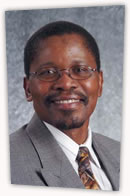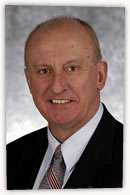At the recent Honors Convocation, four faculty members were recognized with Distinguished Faculty Awards. A university tradition since 1969, the awards are presented annually to faculty members who make significant contributions to their fields or to the university. Honorees are nominated by their peers, students, administrators, or staff members and are chosen by a committee of the University Senate.
For Creative Arts, Patricia Villalobos-Echeverría
 Villalobos-Echeverría has achieved national and international recognition for her creative output. Over the past eighteen years, she has been included in over sixty group shows and has been featured in seventeen solo exhibitions. Many of these exhibitions have been of an international status. She has received numerous awards and fellowships, including two Pennsylvania Council for the Arts Individual Artist Fellowships. She has been awarded five residencies from institutions that include Carnegie Mellon University and the University of Iowa. Villalobos-Echeverría has taken part in numerous academic conferences as a presenter and panelist and has been an invited lecturer or panelist at numerous universities and art centers. She has been included in three books currently in print.
Villalobos-Echeverría has achieved national and international recognition for her creative output. Over the past eighteen years, she has been included in over sixty group shows and has been featured in seventeen solo exhibitions. Many of these exhibitions have been of an international status. She has received numerous awards and fellowships, including two Pennsylvania Council for the Arts Individual Artist Fellowships. She has been awarded five residencies from institutions that include Carnegie Mellon University and the University of Iowa. Villalobos-Echeverría has taken part in numerous academic conferences as a presenter and panelist and has been an invited lecturer or panelist at numerous universities and art centers. She has been included in three books currently in print.
For Research, Lynn Botelho
 Botelho believes that undergraduate education must be provided by a scholar who is on the cutting edge of research. She has fulfilled this role by maintaining an active research agenda with her work on the elderly in early modern England and the trans-Atlantic world. She has published numerous monographs, essays, peer-reviewed articles, notes, and reviews. While maintaining her teaching and service activities, she has published six books and ten articles and presents papers at professional conferences every year, in addition to organizing conferences. She also pursues and receives numerous research awards and grants and serves on an editorial board. One of her most profound works is her book entitled Old Age and the English Poor Law, 1500-1700, the first to examine the elderly in early modern England. She continues to publish various works related to this research interest, including a coauthored book entitled The History of Old Age. This book has been published in England, North America, and Germany, where it was a Book of the Month Club selection.
Botelho believes that undergraduate education must be provided by a scholar who is on the cutting edge of research. She has fulfilled this role by maintaining an active research agenda with her work on the elderly in early modern England and the trans-Atlantic world. She has published numerous monographs, essays, peer-reviewed articles, notes, and reviews. While maintaining her teaching and service activities, she has published six books and ten articles and presents papers at professional conferences every year, in addition to organizing conferences. She also pursues and receives numerous research awards and grants and serves on an editorial board. One of her most profound works is her book entitled Old Age and the English Poor Law, 1500-1700, the first to examine the elderly in early modern England. She continues to publish various works related to this research interest, including a coauthored book entitled The History of Old Age. This book has been published in England, North America, and Germany, where it was a Book of the Month Club selection.
For Service, Calvin Masilela
 In August 2003, Masilela wrote a competitive grant funded at $220,000 per year which made IUP one of three universities in Pennsylvania to host the Ronald McNair Post-baccalaureate Achievement Program. The program prepares academically promising undergraduate students who come from low-income, first-generation, and minority backgrounds for graduate studies so that they can eventually earn a doctoral degree.
In August 2003, Masilela wrote a competitive grant funded at $220,000 per year which made IUP one of three universities in Pennsylvania to host the Ronald McNair Post-baccalaureate Achievement Program. The program prepares academically promising undergraduate students who come from low-income, first-generation, and minority backgrounds for graduate studies so that they can eventually earn a doctoral degree.
Since its first cohort was selected in 2004, a total of seventy McNair scholars have participated in the program. His original proposal was re-funded in 2007.
. Masilela also serves as chairperson of the Student Cooperative Association Board. During his tenure, the Co-op has overhauled its human resources policies and its bylaws and has completed an economic impact study on the local and regional level. Masilela has also served on the University Planning Council since 2004 and was a member of the Enrollment and Management subcommittee analyzing enrollment trends at IUP.
For Teaching, Richard Lamberski
 A member of the Communications Media faculty, Lamberski has earned a reputation as an innovative educator and trusted advisor. Overseer of the department's successful internship program, Lamberski has worked tirelessly to connect student academic studies with real-world experiences. He has cochaired the Task Force for Internships and Experiential Education and has shared his expertise in this area, including work with the university's Council of Trustees. During his tenure at IUP, Lamberski has been active with various fraternal organizations and student professional societies, utilizing the royalties from his own workbook and manual sales to create and support recognition awards for student professional achievement and meritorious service. As noted by one colleague, “He changes lives, creates a desire for learning, and develops a love for the discipline within the department's students. Richard is without peer…an encourager and an enabler.”
A member of the Communications Media faculty, Lamberski has earned a reputation as an innovative educator and trusted advisor. Overseer of the department's successful internship program, Lamberski has worked tirelessly to connect student academic studies with real-world experiences. He has cochaired the Task Force for Internships and Experiential Education and has shared his expertise in this area, including work with the university's Council of Trustees. During his tenure at IUP, Lamberski has been active with various fraternal organizations and student professional societies, utilizing the royalties from his own workbook and manual sales to create and support recognition awards for student professional achievement and meritorious service. As noted by one colleague, “He changes lives, creates a desire for learning, and develops a love for the discipline within the department's students. Richard is without peer…an encourager and an enabler.”